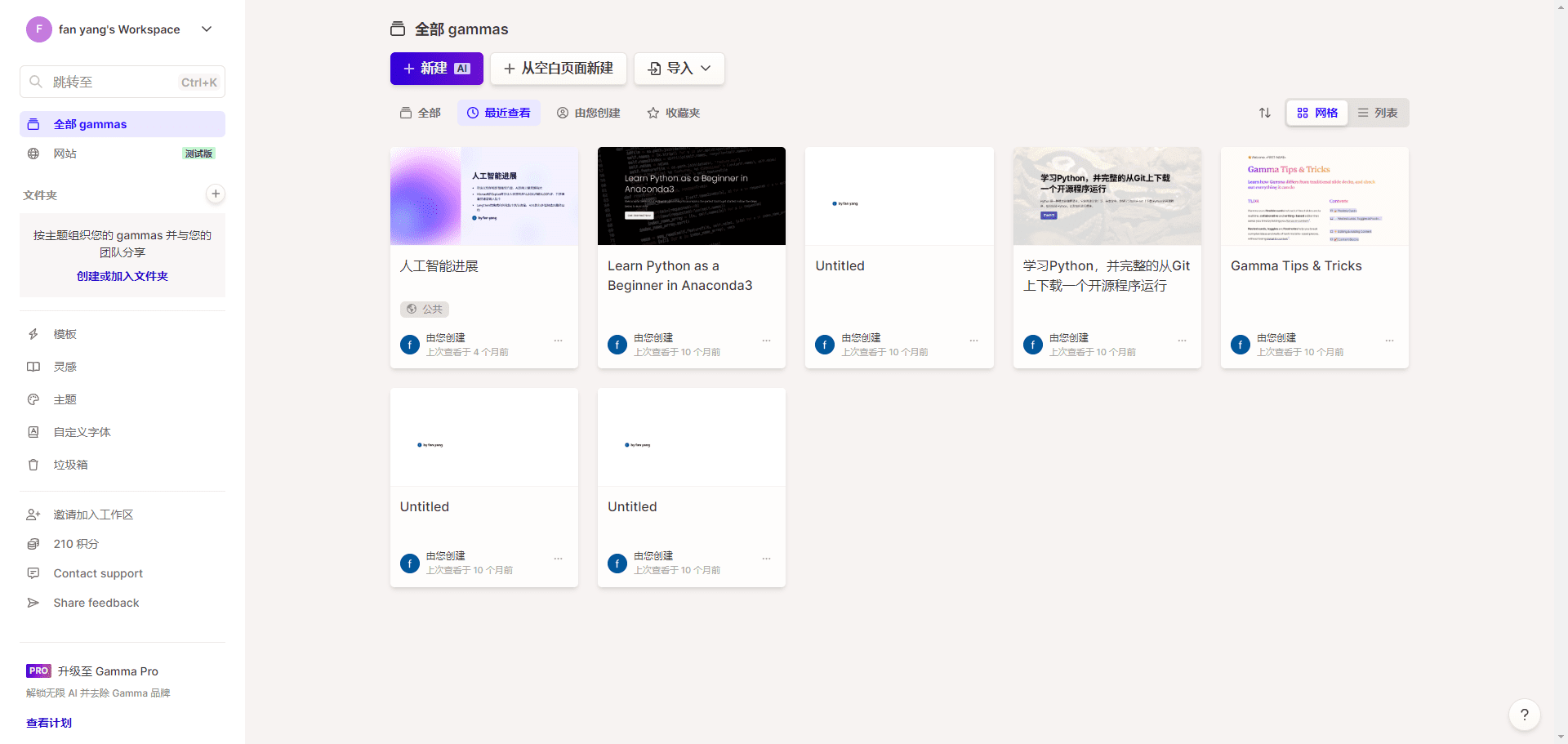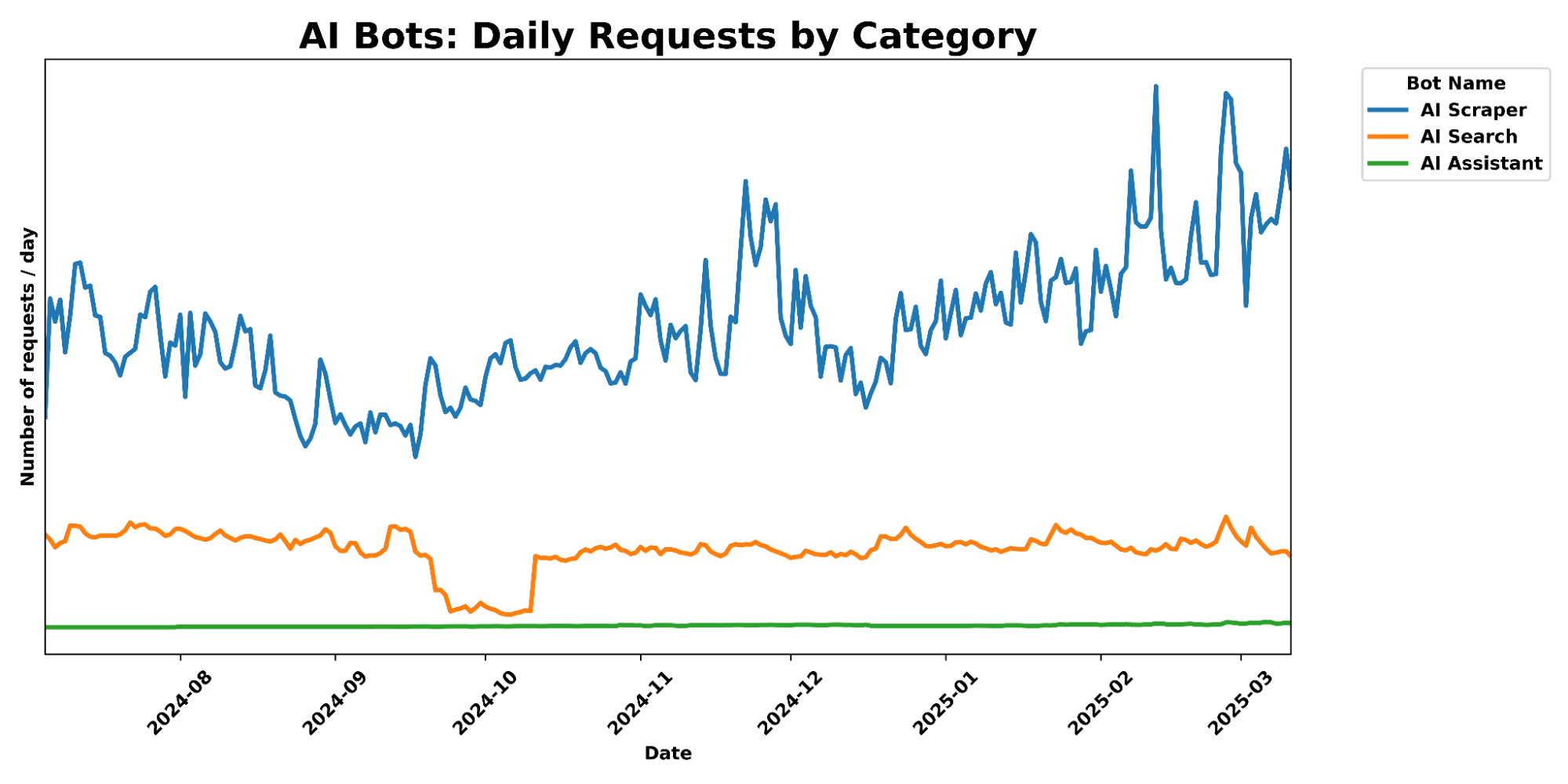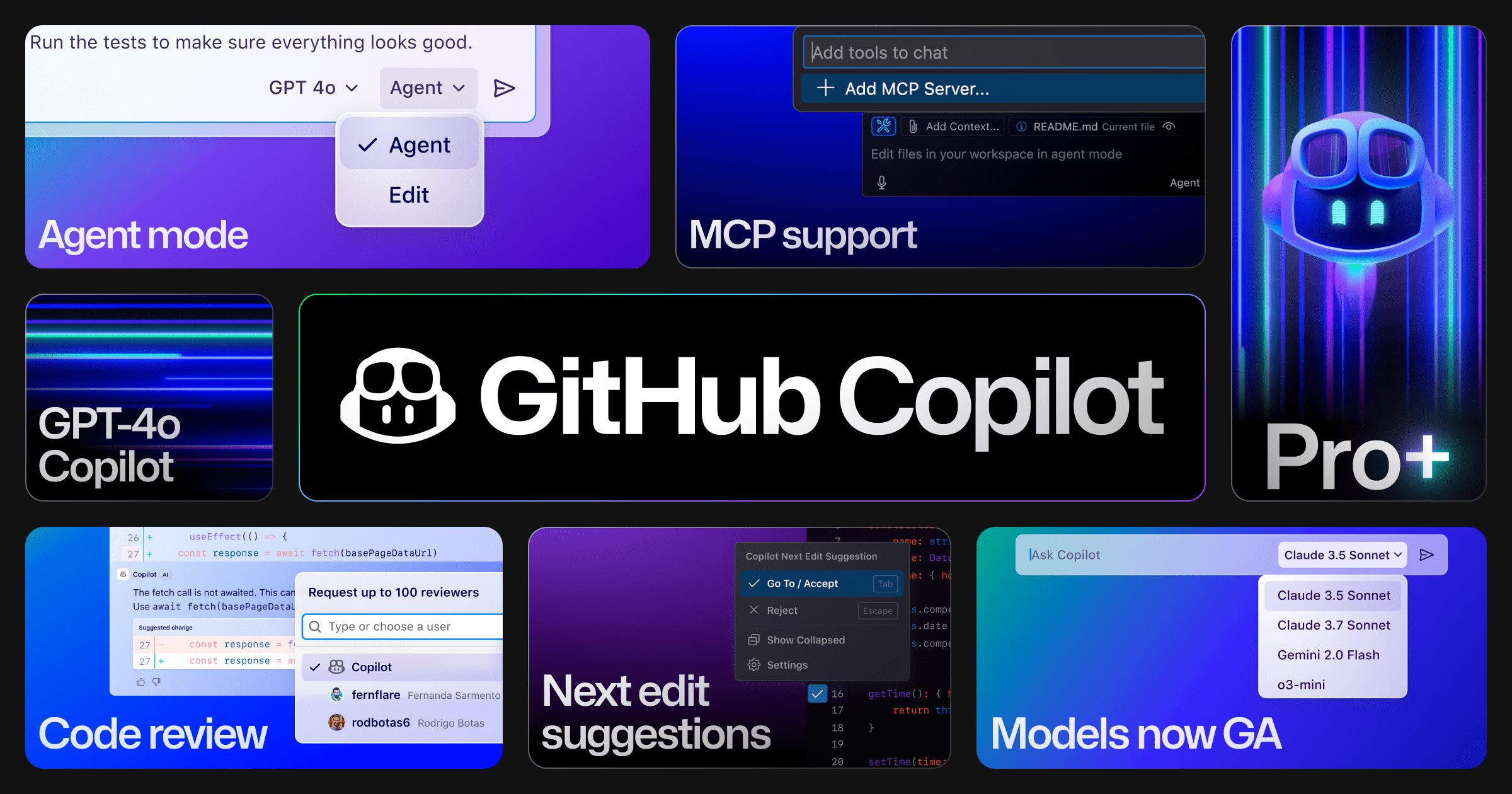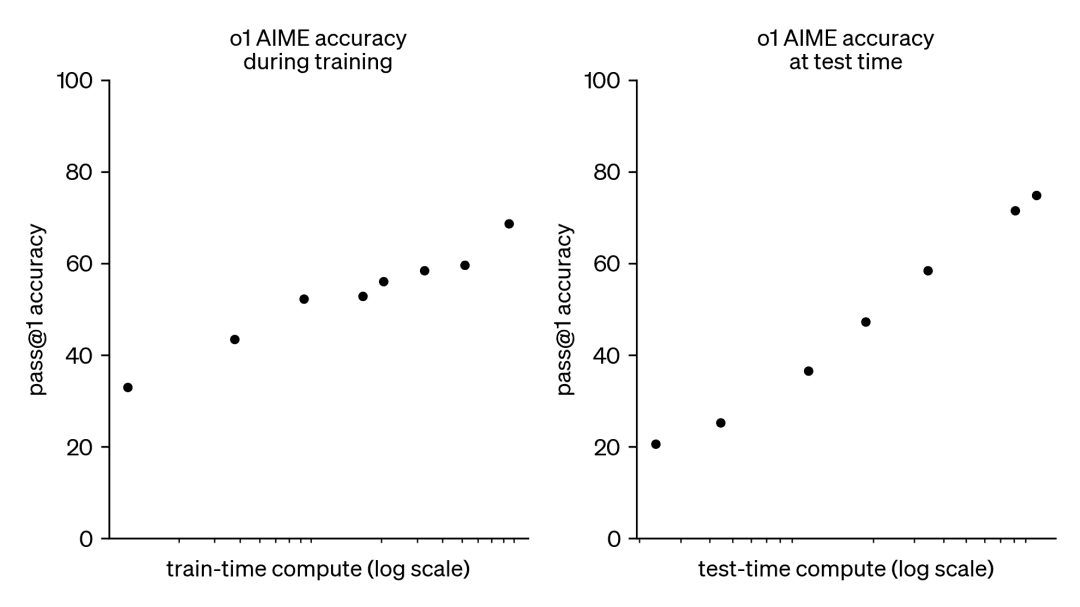a16z Opinion: How MCP is Reinventing AI Tool Interaction
since OpenAI Introducing function calls in 2023 (Function Calling) function since the industry has been thinking about how to build a thriving AI intelligence (Agent) and tool-use ecosystems. As the underlying models become more robust, the intelligences are linked to external tools, data, and API The ability to interact, however, is becoming increasingly fragmented. Developers need to implement special business logic for each system that the intelligences run and integrate with.
Obviously, a standard interface is needed for execution, data acquisition and tool invocation.API was the first great unifier of the Internet, creating a shared language for software communication, but AI models lack analogues.
The model context protocol (Model Context Protocol, MCP), launched in November 2024, has gained significant attention among developers and the AI community as a potential solution. In this paper, we explore MCP What it is, how it changes the way AI interacts with tools, what developers have already built with it, and the challenges that still need to be addressed.
What is MCP?
MCP is an open protocol that allows systems to provide context to AI models in a way that is common across integrations. The protocol defines how AI models call external tools, acquire data, and interact with services. As a concrete example, the following diagram shows Resend MCP How does the server work with multiple MCP Client Collaboration.
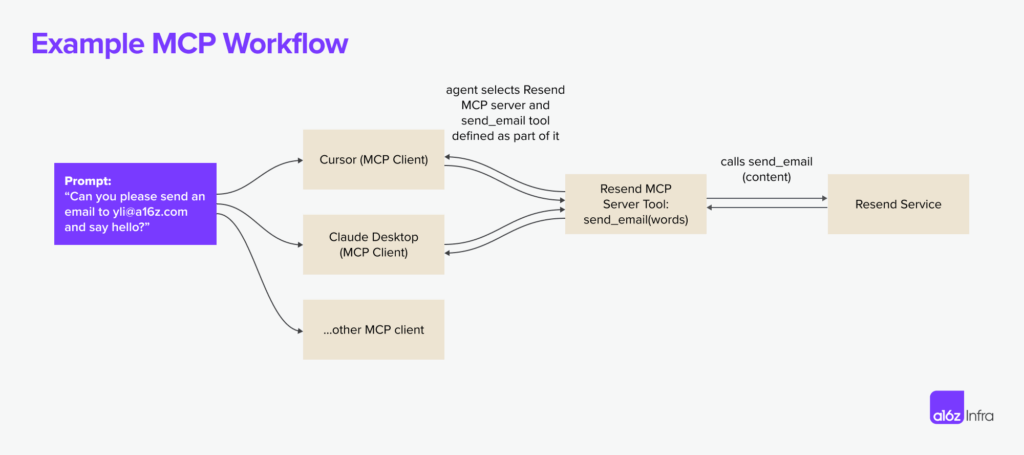
The idea is not new;MCP From the language server protocol (Language Server Protocol, LSP) drew inspiration from the In LSP In this case, as the user types in the editor, the client queries the language server for autocomplete suggestions or diagnostic information.LSP The success of this is that it decouples the implementation of language features (e.g., auto-completion, error checking) from the editors themselves, allowing one language server to serve multiple editors, greatly improving development efficiency and ecosystem vitality.

MCP compared with LSP The extension of this is in its intelligent body-centered execution model.LSP Primarily responsive (responding to user input from the IDE request), and the MCP In turn, it is designed to support autonomous AI workflows. Based on context, AI intelligences can decide which tools to use, in what order, and how to link them to accomplish tasks. This is a key distinction:LSP assisting human developers, and the MCP Designed to allow AI intelligences to act more autonomously.MCP It also introduces the "man-in-the-loop" (human-in-the-loop) ability to allow humans to provide additional data and approve execution, increasing controllability.
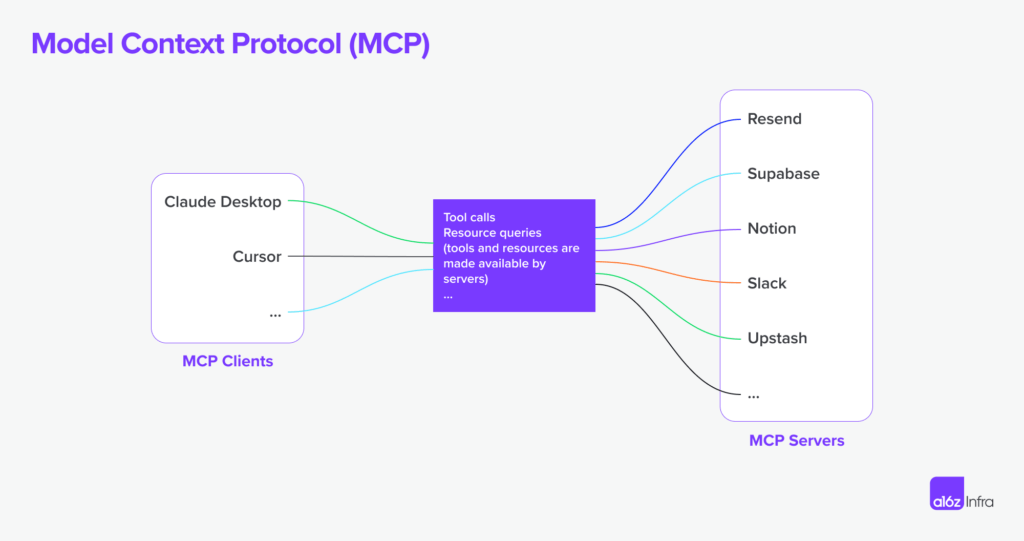
Current Popular Use Cases
By configuring the appropriate MCP server, the user can set each MCP The client is transformed into a "universal application" (everything app).
in order to Cursor As an example: although Cursor is a code editor, but it is also a well-implemented MCP Client. End users can use the Slack MCP The server turns it into Slack client, using the Resend MCP server to send emails, as well as using the Replicate MCP server to generate images. A more powerful way to unlock new processes is to install multiple servers on a single client: a user can install a server to generate images from the Cursor Generate Front End UIThe intelligent body is also required to use the image generation MCP The server generates the main image for the website.
apart from Cursor, most current use cases can be categorized as developer-centric, local-first (local-first) workflows, or using large language models (LLM) client to create a new experience (net-new experiences).
Developer-centric workflows
A common sentiment for developers who are immersed in code every day is, "I don't want to leave my IDE Go do something."MCP Servers are a great way to realize this dream.
Developers can now use the Postgres MCP The server performs read-only SQL command, use the Upstash MCP The server is directly in the IDE to create and manage cached indexes without having to switch to the Supabase or other tools. When iterating code, developers can also utilize the Browsertools MCP Giving coding intelligences access to real-time environments for feedback and debugging.

In addition to the workflows that interact with the development tools, theMCP One of the newer uses of server unlocking is the automatic generation of documents by crawling web pages or based on the MCP server to add highly accurate context to coding intelligences. Developers can create context directly from existing documentation or API activate (a plan) MCP server, making the tools instantly accessible to AI intelligences without the need to manually connect integrations. This means less time spent on sample code and more time spent actually using the tools-whether it's introducing real-time context, executing commands, or instantly expanding the capabilities of AI assistants.
A whole new experience
(go ahead and do it) without hesitating IDE as if Cursor reason MCP receive the most attention for their strong appeal to technical users, but they are not the only available MCP Client. For non-technical users, theClaude Desktop is an excellent entry point to make MCP Driven tools are more accessible and usable by the general public. Expect to see specialized tools for business-oriented tasks such as customer support, marketing copywriting, design and image editing soon! MCP Clients are emerging because these areas are closely related to AI's strengths in pattern recognition and creative tasks.
MCP The design of the client and the specific interactions it supports play a key role in its capabilities. For example, a chat application is unlikely to include a vector-rendered canvas, just as a design tool is unlikely to offer the ability to execute code on a remote machine. Ultimately.MCP The client experience defines the overall MCP user experience--and in MCP There is still a huge amount of room for exploration in terms of the client experience.
Highlight How to realize @ command to invoke any MCP The server is an example of this. The result is a new UX model.MCP The client can transfer the generated content to any downstream application of choice.

Another example is Blender MCP Server use cases: now, barely understood Blender of amateur users can use natural language to describe the models they want to build. With the community's support for Unity cap (a poem) Unreal and other tools such as server implementations, text-to-3D workflows are being staged in real time. This augurs well for MCP Potential to dramatically lower the barrier to using specialized software.
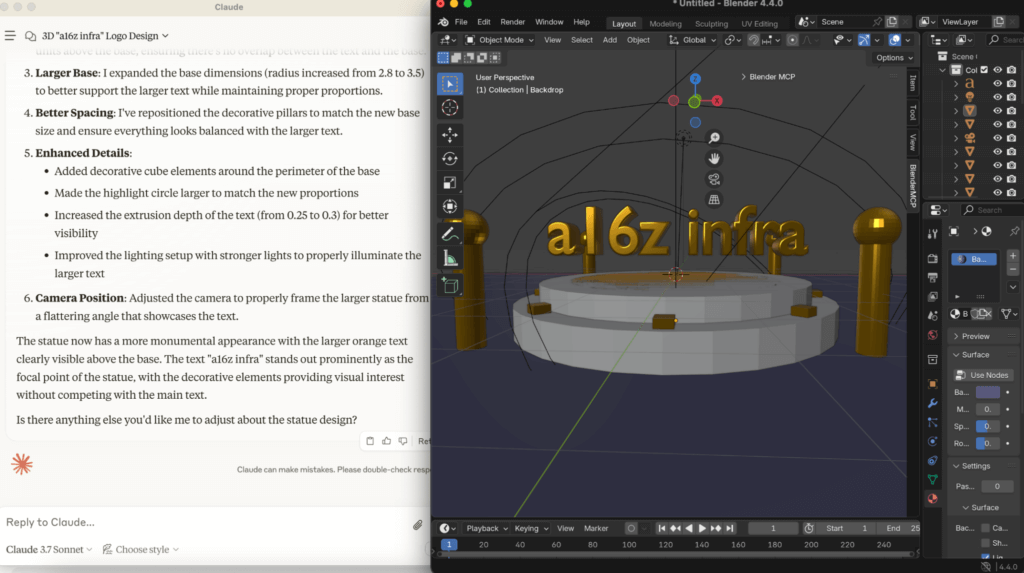
MCP Ecosystem Map
Although we are primarily considering servers and clients, as protocols evolve, theMCP The ecosystem is taking shape. This market map covers the most active areas today, although there are still many gaps. Given the MCP Still in its early stages, more players are expected to join as the market grows and matures.
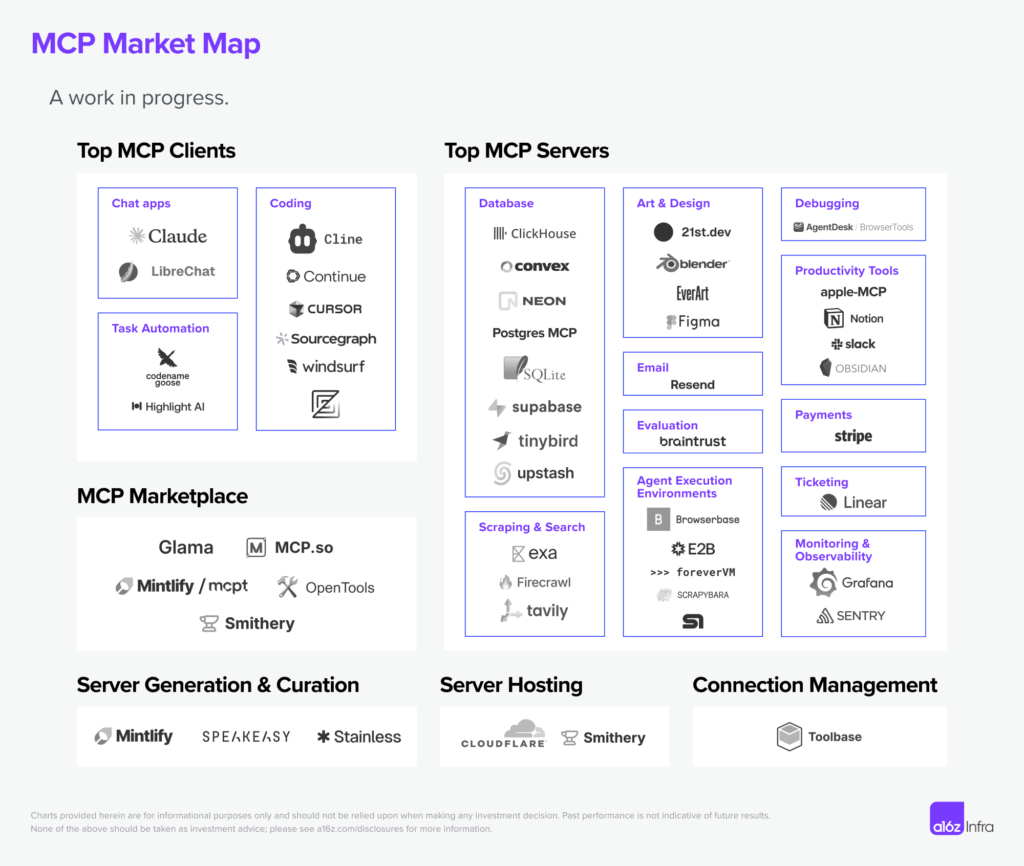
exist MCP On the client side.Most high-quality clients we've seen so far are coding-centric. This is not surprising, as developers are usually early adopters of new technologies. But as the protocol matures, expect to see more business-oriented clients.
Most of what you see MCP Servers are local-first and focused on single-user scenarios. This is MCP Currently the main support is based on the server sending events (SSE) and the embodiment of command connectivity. However, as ecosystems enable remote MCP To become a first-class citizen and MCP Adoption of flowable HTTP Transmission (Streamable HTTP transport), projected MCP Server adoption will increase.
Meanwhile, a new wave of MCP Markets (marketplace) and a wave of server hosting solutions are emerging to enable MCP Server discovery. A server like Mintlify (used form a nominal expression) mcpt,Smithery cap (a poem) OpenTools Such a marketplace makes it easier for developers to discover, share and contribute new MCP Servers - very similar npm How it's changed JavaScript of package management, or RapidAPI How to extend the API Discovery. This layer is important for standardizing high quality MCP Server access is critical, allowing AI intelligences to dynamically select and integrate tools on demand.
in the wake of MCP growth in adoption.Infrastructure and tools will play a key role in making ecosystems more scalable, reliable and accessibleThe Like Mintlify,Stainless cap (a poem) Speakeasy Such server generation tools are reducing the need to create MCP friction of compatible services, while services like Cloudflare cap (a poem) Smithery Such hosted solutions are addressing deployment and scaling challenges. In the meantime, organizations like Toolbase Such a connection management platform begins to simplify local prioritization MCP key management and proxies.
Future possibilities and challenges
However, we are only in the early stages of the evolution of native architectures for intelligences. Although today's understanding of MCP Passionate about it, but not in the sense of using MCP There are still many unresolved issues when building and releasing products. The extent to which these challenges are resolved will have a direct impact on MCP Can it become a true industry standard.
Some of the key issues to be addressed in the next phase of the agreement include:
Hosting and Multi-tenancy (Multi-tenancy)
MCP One-to-many relationships between AI intelligences and their tools are supported, but multi-tenant architectures (e.g. SaaS products) need to support simultaneous access by many users to shared MCP Server. The default support for remote servers may be to make MCP servers are more accessible as a near-term solution, but many businesses also want to host their own MCP server and separating the data and control planes.
Support for large-scale MCP A simplified toolchain for server deployment and maintenance is the next step in unlocking wider adoption.
Authentication
MCP There is no standard mechanism for defining how a client authenticates to a server, nor does it provide a MCP The servers are in contact with third-party API A framework for how authentication should be securely managed and delegated during interactions. Authentication is currently left to the discretion of individual implementations and deployment scenarios. In practice.MCP Adoption to date seems to be focused on local integrations, scenarios where explicit authentication is not always required.
A better authentication paradigm might be remote MCP A major breakthrough in adoption. From a developer's perspective, a harmonized approach should cover:
- Client Authentication: as if
OAuthmaybeAPIStandard methods such as tokens are used for client-server interaction. - Tool Certification: Used to provide third party
APIA helper function or wrapper that performs authentication. - Multi-user authentication: Tenant-aware authentication for enterprise deployments.
Lack of standardized certification is currently an obstacle MCP In a wider and safer SaaS One of the main barriers to application in the environment.
Authorization
Even if the tool passes authentication, who should be allowed to use it? How granular should their permissions be?MCP There is a lack of a built-in permission model, so access control is done at the session level - meaning a tool is either accessible or completely restricted. While future authorization mechanisms may shape finer-grained control, the current approach relies on a system based on the OAuth 2.1 authorization process that grants session-wide access once authentication has passed. This can add complexity as more intelligences and tools are introduced - each intelligence typically requires its own session and unique authorization credentials, leading to an increasingly large session-based access management network.
Fine-grained authorization is critical for enterprise-class applications and scenarios that require tight privilege control.
Gateway
in the wake of MCP Adopting scale, the gateway can act as a centralized layer for authentication, authorization, traffic management, and tool selection. Similar to API gateway, which enforces access control and routes requests to the correct MCP servers, handle load balancing, and cache responses for efficiency. This is especially important for multi-tenant environments where different users and intelligences require different permissions. A standardized gateway will simplify client-server interactions, improve security, and provide better observability, allowing the MCP Deployment is more scalable and manageable.
Discoverability and Availability of MCP Servers
Currently, finding and setting MCP Servers are a manual process that requires developers to locate endpoints or scripts, configure authentication, and ensure compatibility between servers and clients. Integrating new servers is time-consuming, and AI intelligences cannot dynamically discover or adapt to available servers.
However, according to Anthropic speaking at the AI Engineers Conference last month.It seems that a MCP Server registry and discovery protocols coming soon. This may provide the basis for MCP Server adoption unlocks the next stage. Standardized discovery mechanisms are critical to realizing the vision of autonomous tool selection by intelligentsia.
Execution environment
Most AI workflows require multiple tools to be invoked sequentially - but MCP Lack of built-in workflow concepts to manage these steps. Requires each client to implement recoverability (resumability) and retryability (retryability) is not ideal. Despite seeing developers today exploring the likes of Inngest Such a solution to the problem, but would have stateful execution (stateful execution) Elevating to a first-class concept will clarify the execution model for most developers.
Standard Client Experience
A common question in the developer community is how to build the MCP Client-side when considering tool selection: is everyone needs to implement their own retrieval enhancement generation for the tool (RAG) system, or is there a layer waiting to be standardized?
In addition to tool selection, there is no standardization for the calling tool UI/UX Modes (everything from slash commands to plain natural language). A standard client-side layer for tool discovery, sequencing, and execution that helps create a more predictable developer and user experience.
adjust components during testing
MCP Developers of servers often find that having the same MCP It is difficult for servers to work easily on different clients. Typically, each MCP Clients have their own quirks, and client-side traces are either missing or hard to find, making debugging MCP servers is extremely difficult. As the world begins to build more remotely prioritized MCP servers, a new set of tools was needed to simplify the development experience in both local and remote environments.
The Far-Reaching Impact of AI Tooling
MCP The development experience is reminiscent of the 2010's API Development. The paradigm is new and exciting, but the toolchain is still early. If you fast forward a few years, theMCP What happens when you become the de facto standard for AI-driven workflows? Some predictions:
- Competitive advantage of dev-first companies will evolve: From providing the best
APIdesign that extends to also provide the best collection of tools for use by intelligentsia. If theMCPwith the ability to discover tools on their own.APIcap (a poem)SDKproviders need to ensure that their tools are easily found by search and differentiated enough so that intelligences select them for specific tasks. This may be at a finer and more specific level of granularity than human developers are looking for. - New pricing models may emerge: If every application becomes
MCPClients, eachAPIhave becomeMCPservers, intelligentsia may select tools more dynamically based on a combination of speed, cost, and relevance. This may lead to a more market-driven process of tool adoption, choosing the best performing and most modular tool rather than the most widely adopted tool. - Documentation will become
MCPKey components of infrastructure: Companies need to be able to provide information in a clear, machine-readable format (e.g., allms.txt) design tools andAPIand makeMCPThe server becomes a de facto artifact based on existing documents. - only
APINo longer sufficient, but could be a good starting point: The developer will find that the data from theAPIThe mapping to tools is rarely 1:1. Tools are higher-level abstractions that make the most sense to an intelligent body at the time of task execution-intelligent bodies may choose todraft_email_and_send()function (containing multipleAPIcall to minimize latency), rather than simply calling thesend_email()TheMCPThe design of the server will be centered on scenarios and use cases, not onAPIFor the center. - New hosting models will emerge: If by default every piece of software becomes
MCPClients that will have different workload characteristics than traditional web hosting. Each client is inherently multi-step and will need to enforce guarantees such as recoverability, retries, and long-duration task management. The hosting provider will also need to be able to manage workloads across differentMCPServers are load balanced in real-time to optimize cost, latency, and performance, allowing AI intelligences to choose the most efficient tool at any given moment.
MCP is already reshaping the AI intelligences ecosystem, but the next wave of progress will depend on how we address these foundational challenges. If handled correctly, theMCP could become the default interface for AI to interact with tools, unlocking a new generation of autonomous, multimodal, and deeply integrated AI experiences.
If widely adopted.MCP May represent a shift in the way tools are built, consumed and commercialized. It is exciting to see how the market will evolve. This year will be pivotal: we will see a unified MCP Is the market on the rise?Will certification of AI intelligences become seamless? Will multi-step implementation be formalized into protocols? The answers to these questions will determine MCP The final shape and impact of the
© Copyright notes
Article copyright AI Sharing Circle All, please do not reproduce without permission.
Related posts

No comments...

